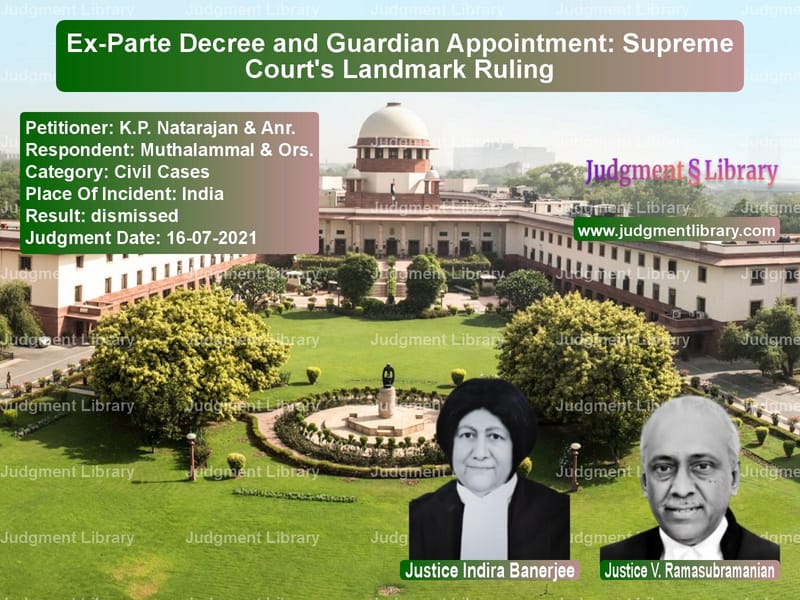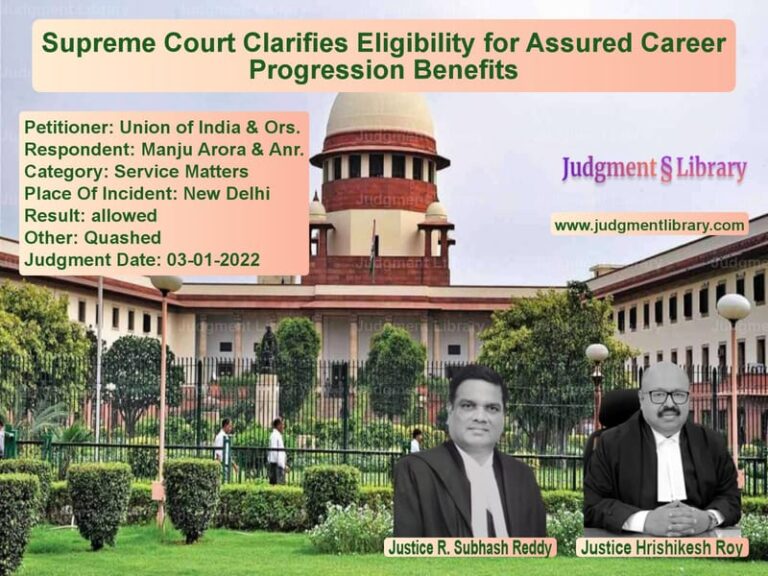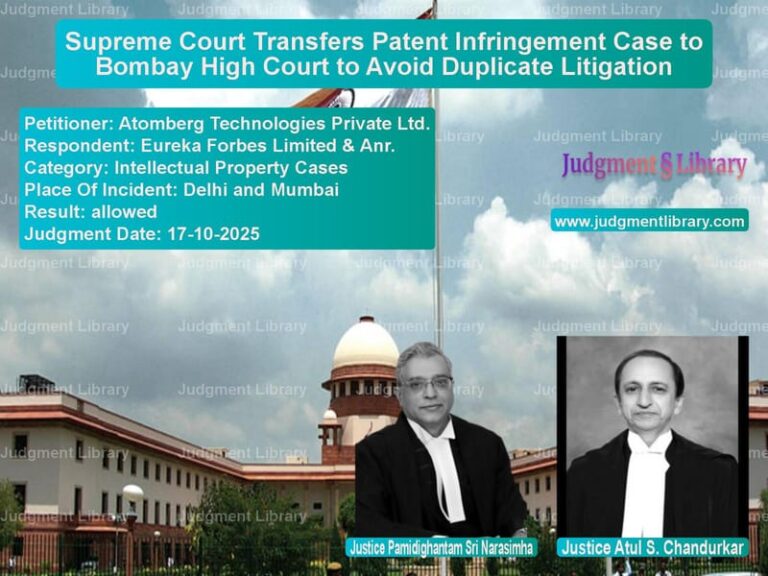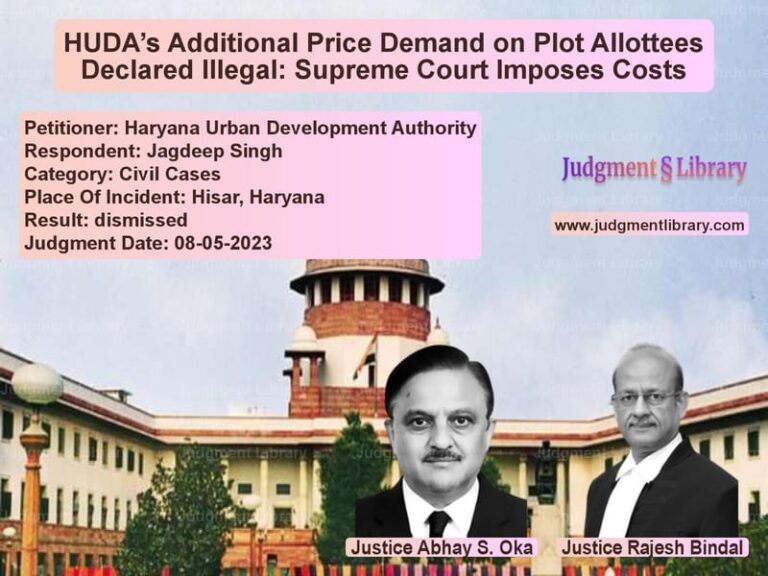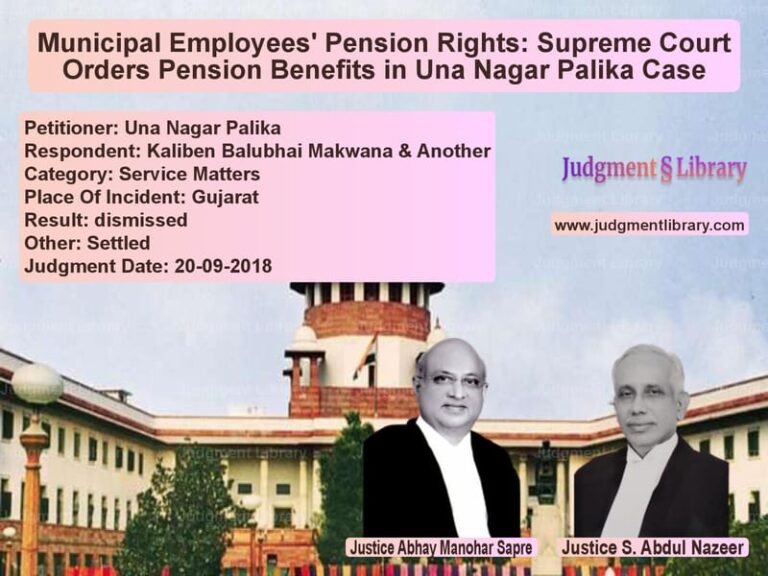Ex-Parte Decree and Guardian Appointment: Supreme Court’s Landmark Ruling
The Supreme Court recently delivered a significant ruling in the case of K.P. Natarajan & Anr. v. Muthalammal & Ors., addressing crucial issues related to ex-parte decrees, appointment of a guardian for minors in civil cases, and the power of the High Court under Article 227. The judgment, delivered on 16th July 2021 by a bench comprising Indira Banerjee and V. Ramasubramanian, sets an important precedent in civil procedural law.
The case revolves around a suit for specific performance of a sale agreement, where an ex-parte decree was passed against a minor without the appointment of a guardian in accordance with the prescribed legal procedures. The High Court exercised its supervisory jurisdiction under Article 227 of the Constitution and set aside the decree, holding it as a nullity.
Background of the Case
The dispute originated from a suit (O.S. No.264 of 2013) filed by the petitioners seeking specific performance of a sale agreement dated 25th April 2011. The defendants were duly served with summons but failed to appear before the trial court, leading to an ex-parte decree on 8th April 2015.
One of the defendants, the third respondent, was a minor at the time the suit was filed. However, the procedure mandated under Order XXXII, Rule 3 of the Code of Civil Procedure (CPC)—which requires proper appointment of a guardian for minors—was not followed correctly.
Upon learning of the decree, the respondents filed a petition in 2017 seeking to set it aside, citing that it was passed without proper representation of the minor. They also sought condonation of a delay of 862 days in filing the application. The trial court dismissed the application, but the High Court set aside the decree using its supervisory powers under Article 227.
Legal Issues Before the Court
- Whether the ex-parte decree against the minor was a nullity due to non-compliance with Order XXXII, Rule 3 of CPC.
- Whether the High Court, while exercising jurisdiction under Article 227, was justified in setting aside the decree despite the long delay.
- Whether the High Court’s power under Article 227 allows it to intervene in procedural irregularities affecting substantive rights.
Arguments by the Petitioners
The petitioners, represented by senior advocate S. Nagamuthu, argued:
- The High Court exceeded its jurisdiction by setting aside the decree in a revision petition arising out of an application under Section 5 of the Limitation Act, 1963.
- The respondents were grossly negligent in defending the suit and should not benefit from their inaction.
- The trial court had already examined the issue of delay and found no sufficient cause to condone it.
- The decree was already executed, and setting it aside would cause irreparable loss to the petitioners.
Arguments by the Respondents
The respondents, represented by senior advocate R. Balasubramanian, contended:
- The trial court failed to properly appoint a guardian for the minor, rendering the decree a nullity.
- The High Court was justified in exercising its supervisory powers under Article 227 to correct a grave procedural lapse.
- The petitioners, having failed to ensure proper compliance with Order XXXII, Rule 3, could not claim equity in their favor.
- The rights of a minor cannot be prejudiced due to procedural irregularities committed by the court.
Supreme Court’s Observations
The Supreme Court upheld the High Court’s ruling, making the following key observations:
- Importance of Guardian Appointment: The Court reaffirmed that an ex-parte decree against a minor without proper appointment of a guardian is a nullity.
- High Court’s Supervisory Powers: It held that the High Court was well within its jurisdiction to invoke Article 227 to rectify a fundamental procedural irregularity.
- Delay Not a Hindrance: The Court noted that the issue was not just about condoning delay but about ensuring that the rights of a minor were not compromised.
- Binding Precedents: The judgment cited previous rulings, including Surya Dev Rai v. Ram Chander Rai and Radhey Shyam v. Chhabi Nath, to emphasize the High Court’s role in ensuring procedural fairness.
Final Verdict
The Supreme Court dismissed the petition, affirming the High Court’s decision to set aside the ex-parte decree. The Court ruled that:
- The trial court’s failure to appoint a guardian as per Order XXXII, Rule 3, invalidated the decree.
- The High Court was justified in intervening under Article 227, even in a revision petition concerning delay condonation.
- Once a decree is found to be a nullity, it cannot be upheld merely due to procedural delays.
Impact of the Judgment
This ruling has far-reaching implications for civil litigation:
- Strengthens Protection for Minors: Courts must ensure strict compliance with Order XXXII, Rule 3 when dealing with cases involving minors.
- Reinforces High Court’s Role: The judgment reaffirms that High Courts can use Article 227 to correct fundamental procedural errors.
- Clarifies Delay Considerations: The decision clarifies that procedural delays cannot justify the enforcement of an invalid decree.
Conclusion
The Supreme Court’s judgment in K.P. Natarajan & Anr. v. Muthalammal & Ors. establishes a vital precedent in civil litigation. It underscores the importance of proper representation of minors, reinforces the High Court’s supervisory powers, and ensures that procedural lapses do not lead to miscarriage of justice.
With this ruling, courts are reminded that ensuring compliance with procedural safeguards is not merely a technicality but a fundamental necessity to protect the rights of vulnerable litigants.
Petitioner Name: K.P. Natarajan & Anr..Respondent Name: Muthalammal & Ors..Judgment By: Justice Indira Banerjee, Justice V. Ramasubramanian.Place Of Incident: India.Judgment Date: 16-07-2021.
Don’t miss out on the full details! Download the complete judgment in PDF format below and gain valuable insights instantly!
Download Judgment: k.p.-natarajan-&-anr-vs-muthalammal-&-ors.-supreme-court-of-india-judgment-dated-16-07-2021.pdf
Directly Download Judgment: Directly download this Judgment
See all petitions in Specific Performance
See all petitions in Property Disputes
See all petitions in Succession and Wills
See all petitions in Judgment by Indira Banerjee
See all petitions in Judgment by V. Ramasubramanian
See all petitions in dismissed
See all petitions in supreme court of India judgments July 2021
See all petitions in 2021 judgments
See all posts in Civil Cases Category
See all allowed petitions in Civil Cases Category
See all Dismissed petitions in Civil Cases Category
See all partially allowed petitions in Civil Cases Category

